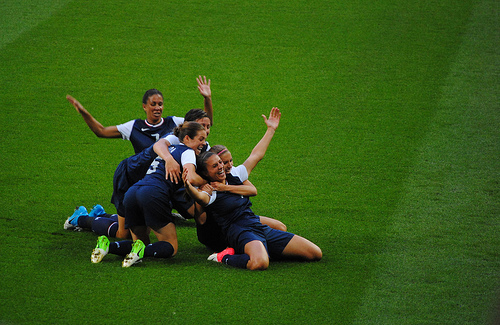The following thoughts were prompted by watching the U.S. women’s soccer team win gold in satisfying fashion. I’ll have more on soccer further down, but the women are ruling the U.S. Olympic effort so far. They’ve won more than 50% of the medals won by USA so far. I don’t have exact numbers yet because the Games are still in progress, but chew on these facts: The women’s soccer team won gold, whereas the men’s team didn’t qualify for the Olympic tournament. The women’s water polo team won gold, while the men fell in the quarterfinals. The women’s indoor volleyball team is playing for gold over the weekend, while the men’s team lost in the quarterfinals. The women’s beach volleyball teams finished 1-2, while the men were knocked out before the medal rounds. Claressa Shields and Marlen Esparza won medals for boxing, while the men were entirely shut out of the medals (the first time that has ever happened in an Olympics where the U.S. competed). The women’s gymnastics team outperformed the men. Not all these athletes received the benefits of Title IX, but still it’s a beautiful thing, ain’t it?
Which isn’t to say that things are all rosy on the women’s side of sports. The whole Lolo Jones controversy (kicked up by Jere Longman’s sniping piece in the New York Times) has raised a host of interesting issues. Of course Jones was overhyped relative to defending Olympic gold medalist Dawn Harper, and it was likely because Jones is gorgeous and better at marketing herself, though evidently not so good at it as to prevent Longman from writing his piece. But then she was still a legitimate player in the medal race and she had a compelling story, having led the 110m hurdles finals in Beijing before falling near the end.
To me, this whole thing isn’t a sports story so much as it is an indicator of how society at large tends to treat women. In any field, attractive people tend to receive preferential treatment, and we see it even in sports, which is the one place where beauty theoretically shouldn’t matter. There have been male athletes who’ve been overrated because they’ve been good-looking (Derek Jeter, David Beckham), and on the women’s side this seems to be even more pronounced. Look no further than the U.S. women’s soccer team for an example; they’ve received much more coverage than the women’s water polo team. It’s true that the soccer team has a ready-made narrative on their side, but it’s hard not to notice that they also have women who look like Hope Solo and Alex Morgan, where the water polo team does not. (Water polo tends to favor the sort of women and men with thick necks rather than the more willowy types.) For that matter, the U.S. women’s basketball team has largely gone unnoticed by the mainstream press, partly because they’re unchallenged by other nations, and partly because they don’t have a glamor-girl type of player to draw attention to them. (They haven’t had one of those since Lisa Leslie retired.) Disentangling all the prejudices and preconceptions that we have about women in sports will probably take several generations. The best thing we can try to do is try to see these women for who they are rather than measuring them against some imagined standard of how athletes or women or women athletes should behave.
There’s been some fair criticism about the IOC trumpeting the fact that this is the first Olympics where all the participating countries sent female athletes. While the IOC has strong-armed the likes of Saudi Arabia into sending women to compete, it gives these regimes a fig leaf, allowing them to demonstrate some fake progressiveness to the world, while those athletes will go back to countries that are just as repressive as they were before. There’s a good deal of truth in this line of thinking. The alternative to letting these women compete is not letting them compete, but maybe excluding a country like Syria from the Games entirely would help matters. After all, excluding South Africa from international sports competitions during the 1970s and ’80s helped kill off apartheid. Still, I can’t shake the idea that in competing, a woman from one of these countries might win a surprise medal, embarrass a lot of powerful people in her country, and gain a platform for women’s rights there. I don’t know what’s the best course here.
I promised you soccer coverage, so here it is. After losing to Japan in last year’s World Cup final, the U.S. women reversed the result and took the gold medal in front of a crowd of 80,000 at Wembley Stadium yesterday. Alex Morgan made a hell of a play in the seventh minute to touch the ball away from goal toward the byline and then cross it over three defenders to hit Carli Lloyd’s head for the first goal. Morgan ends the tournament with three goals and five assists; a player who can set up goals as well as score them is a rare thing in soccer. Lloyd had missed one of the penalties during the shootout with Japan at the World Cup, so scoring both goals in the final had to be really sweet. Abby Wambach missed the 2008 Olympics after breaking her leg just before the tournament and then watched her teammates win gold without her, so her 2012 gold is the feather in her cap that she has been missing. Megan Rapinoe was subdued in the final, but she had a brilliant tournament that included four three goals (including two in the semifinal against Canada). Looks like I was right about her coming out being an omen. And Hope Solo played like the world’s greatest goalkeeper in the final, mainly because Japan forced her to. The tip save off Shinobu Ohno’s header in the 17th minute was great stuff, and so was the diving save from Mana Iwabuchi in the 82nd minute. The latter was caused by a bad pass from Becky Sauerbrunn to Christie Rampone that left Iwabuchi with a one-on-one chance. Saves like Solo’s make a central defender want to buy her goalkeeper a really expensive Christmas present.
It diminishes none of the above to point out that USA received lots of help from the officials. German referee Bibiana Steinhaus failed to spot a handball by Tobin Heath in the box that should have given Japan a penalty. The real officiating hijinks, though, came in the wacky semi against Canada. Abby Wambach’s equalizing 80th-minute penalty came after Canada goalkeeper Erin McLeod was whistled for holding the ball more than six seconds, a ruling that is technically correct. However, the rule is broken so often and called so seldom that calling it in this case is ticky-tack at best and sinister at worst. The Canadians have good reason to think they’ve been robbed, even if there’s no guarantee that USA wouldn’t have gotten the equalizer without the call, and even though Canada had let in a goal earlier directly from a corner kick, a defensive blunder for which there’s no excuse. (How cute is this: A goal like that is called an “Olympic goal”, even though such a goal had never been scored at the Olympics before Megan Rapinoe did it.) Too bad; Canada’s Christine Sinclair had a hat trick against the Americans and is the one finisher in this tournament equal to Morgan and Wambach. She deserves to win a title. The Canadians come out of this tournament with a bronze, but the bitterness of their semi defeat will give them lots of motivation for when they host Women’s World Cup 2015.
In other news, diver Pandelela Rinong became the first Malaysian woman, as well as the first non-badminton player, ever to win a medal for her country. I love stories like that. They are rejoicing in Kuala Lumpur.
And if you need further reminders that Olympic athletes are tougher than you, U.S. sprinter Manteo Mitchell finished his leg of the 4×400 relay after breaking his leg in the middle of his run. Good grief!
Tune in this weekend for the USA-Brazil women’s volleyball final, in which USA will try to defeat the same team that beat them for the gold four years ago. That should be a barn-burner. I’ll have a wrap-up from the Games on Monday.












